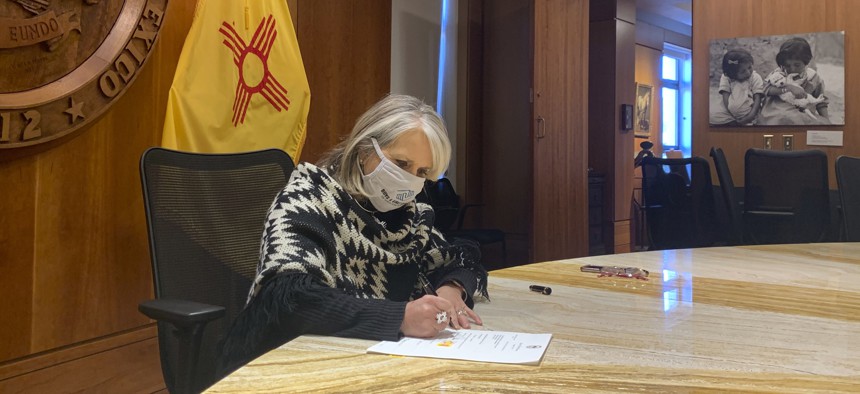‘We Simply Cannot Afford to Wait’: Several States Consider Stimulus Bills

New Mexico Gov. Michelle Lujan Grisham signs a $330 million coronavirus relief package on Nov. 25, 2020. New Mexico Office of the Governor via AP
In the absence of a second federal coronavirus relief package, some state leaders are pushing plans to provide stimulus money to individuals and businesses.
Following months of debate and disagreement that stalled a new round of federal coronavirus relief, some governors and state legislatures are taking stimulus proposals into their own hands.
In Michigan, Gov. Gretchen Whitmer, a Democrat, last week asked Republican legislative leaders to push through a $100 million Covid-19 relief package before the end of the year. “Michigan families are hurting, and while we must continue to advocate for meaningful support from the federal government, we simply cannot afford to wait,” Whitmer wrote.
“It is crucial for us to come together now to pass a targeted, state-based economic stimulus plan … that will provide direct financial support to the families and small businesses that have been hit hardest by the pandemic,” she continued.
Whimer, who also sought an extension of soon-to-expire expanded unemployment benefits and a public mask mandate, is one of several governors who have asked their state legislatures to consider stimulus packages aimed at supporting local businesses or individuals who have lost their jobs during the pandemic. Other states considering stimulus bills include Wisconsin, Minnesota, and Colorado.
Michigan has three weeks to consider legislation before their session adjourns for the year—a tricky feat in a legislative body often beset with partisan disagreements on coronavirus measures. A spokeswoman for Senate Majority Leader Mike Shirkey told the Detroit News that Republicans may agree with the governor on “some policy areas,” but the Michigan Chamber of Commerce has raised concerns about permanently extending unemployment benefits in the state from 20 weeks to 26 weeks.
Wisconsin could see more starkly delineated disagreement, as Democratic Gov. Tony Evers’ request for a $541 million relief package has been largely rebuffed by Republican lawmakers who control both chambers of the legislature. In Minnesota, where Democrats control the governor’s mansion and Republicans control the statehouse, Gov. Tim Walz said last week that they are “pretty close” to a bipartisan agreement on a relief package.
In other states, it’s Republicans lawmakers pushing for stimulus bills with a focus on small business relief. Legislators in New Jersey and Washington state, where Republicans are in the legislative minority in both chambers, have urged their Democratic governors to convene special sessions to address coronavirus relief packages. Many state legislatures are adjourned or still in coronavirus-forced recesses.
Colorado lawmakers convened in a special session on Monday to consider a package of eight coronavirus relief bills. One set of bills would help small businesses with $57 million in direct aid to the industries that have been hit hardest by the recession, allowing bars and restaurants to retain sales taxes for a limited time to offset revenue losses. Another bill would provide $50 million in rental assistance to both tenants and landlords. Other measures in consideration would provide more money to utility assistance for low-income families, child care providers, and food pantries.
In total, the legislature’s budget committee has said they’re comfortable spending around $200 million on a stimulus package. The proposals have bipartisan support on the budget committee.
Before the session began, Senate President Leroy Garcia said “congressional inaction has left millions stranded” in the state.
“The amount the Colorado state government can do to alleviate the burdens of struggling communities is limited, but it’s not nothing,” he said in a statement. Then, in a comment reminiscent of Whitmer’s assessment in Michigan, he said that he “fully believe[s] that federal relief is on its way, but Coloradans simply can’t wait any longer.”
One state has approved a relief package: New Mexico, where Democrats hold a trifecta of state government.
Last week during a one-day special session, the New Mexico legislature passed a bipartisan relief bill that resembles a scaled-back version of the federal coronavirus legislation approved in March. The plan will provide a one-time $1,200 check to unemployed workers and smaller stimulus checks to undocumented immigrants who weren’t eligible for earlier federal help. Money will also be channeled to food banks, housing assistance, coronavirus testing, contact tracing, and aid for businesses with 100 or fewer employees, with a focus on those in the service industry.
Most of the money to pay for these efforts comes from around $319 million in unspent federal aid that will expire by the end of the month. The state also added $10 million from the general fund.
After signing the legislation into law the day before Thanksgiving, Gov. Michelle Lujan Grisham said that the state’s “work isn’t done.”
“We must remain vigilant in our fight against the virus,” she said. “New Mexico will always step up, even when the federal government won’t.”
Emma Coleman is the assistant editor for Route Fifty.
NEXT STORY: Deepening Statehouse Divisions Foretell Big Policy Fights






